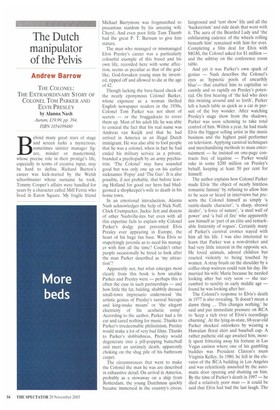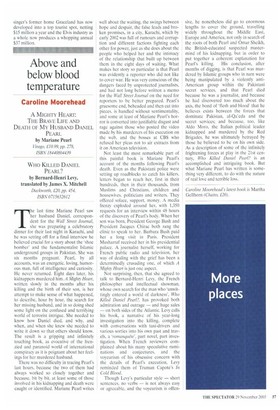The Dutch manipulator of the Pelvis
Andrew Barrow
THE COLONEL: THE EXTRAORDINARY STORY OF COLONEL Tom PARKER AND ELVIS PRESLEY by Manna Nash Aurtim, ,E19.99, pp. 394, ISBN 1854109480 Behind many great stars of stage and screen lurks a mysterious, sometimes sinister manager figure, minder or mastermind, whose precise role in their protégé's life, especially in terms of creative input, may be hard to define. Richard Burton's career was kick-started by the Welsh schoolmaster whose surname he took. Tommy Cooper's affairs were handled for years by a character called Miff Ferric who lived in Eaton Square. My fragile friend
Michael Barrymore was frogmarched to precarious stardom by his amazing wife Cheryl. And even poor little Tom Thumb had the great P. T. Barnum to give him stature.
The man who managed or mismanaged Elvis Presley's career was a particularly colourful example of this breed and his own life, recorded here with some affection, seems as peculiar as that of the god like, God-forsaken young man he invented, ripped off and allowed to die at the age of 42.
Though lacking the bare-faced cheek of the nearly eponymous Colonel Barker, whose exposure as a woman thrilled English newspaper readers in the 1930s, Colonel Tom Parker was not short of secrets — or the braggadocio to cover them up. Most of his adult life he was able to conceal the fact that his real name was Andreas van Kuijik and that he had arrived in America as an illegal Dutch immigrant. He was also able to fool people that he was a colonel, when in fact he had ended his military service as a private, branded a psychopath by an army psychia trist. 'The Colonel' may have sounded good but was only one up on his earlier nicknames 'Popsy' and The Guy'. It is also possible, if not probable, that before leaving Holland for good our hero had bludgeoned a shopkeeper's wife to death in his home town.
In an emotional introduction, Alanna Nash acknowledges the help of Nick Naff, Chick Crumpacker, Jackie Jett and dozens of other Nashville-ites but even with all this expertise fails to explain why Colonel Parker's dodgy past prevented Elvis Presley ever appearing in Europe, the heart of his huge fan base. Was Elvis so stupefyingly juvenile as to need his manager with him all the time? Couldn't other people occasionally be hired to look after the man Parker described as 'my attraction'?
Apparently not, but what emerges most clearly from this book is how unalike Parker and Presley were — perhaps this is often the case in such partnerships — and how little the fat, balding, shabbily dressed small-town impresario understood 'the artistic genius of Presley's surreal hiccups and king-snake moans' or 'the elegant electricity of his aesthetic romp'. According to the author, Parker had a tin ear and cared nothing for music. Thanks to Parker's irredeemable philistinism, Presley would make a lot of very bad films. Thanks to Parker's slobbishness, Presley would degenerate into a pill-popping butterball and meet an untimely death, apparently choking on the shag pile of his bathroom carpet. The circumstances that went to make the Colonel the man he was are described in exhaustive detail. On arrival in America, probably as a stowaway on a ship from Rotterdam, the young Dutchman quickly became immersed in the country's circus, fairground and 'tent show' life and all the 'hucksterism' and side deals that went with it. The aura of the Bearded Lady and 'the exhilarating cadence of the wheels rolling beneath him' remained with him for ever. Completing a film deal for Elvis with MGM, the Colonel asked for $1 million — and the ashtray on the conference room table.
And yet it was Parker's own spark of genius — Nash describes the Colonel's eyes as 'hypnotic pools of unearthly blue'— that enabled him to capitalise so cannily and so rapidly on Presley's potential. On first hearing of 'the kid who does this twisting around and so forth', Parker left a lunch table as quick as a cat in pursuit of the boy wonder. After watching Presley's stage show from the shadows, Parker was soon scheming to take total control of him. Within a year, he had made Elvis the biggest selling artist in the music business and the highest paid performer on television. Applying carnival techniques and merchandising methods to mass entertainment — he insisted on one-page contracts free of legalese — Parker would rake in some $200 million on Presley's behalf, keeping at least 50 per cent for himself.
The author explains how Colonel Parker made Elvis 'the object of nearly limitless romantic fantasy' by refusing to allow him to be seen or heard in interviews but presents the Colonel himself as simply 'a razzle-dazzle character', 'a sharp, shrewd dealer', 'a force of nature', 'a steel wall of power' and 'a ball of fire' who apparently saw himself as 'part of an elite and remarkable fraternity of rogues'. Certainly many of Parker's carnival cronies stayed with him all his life. I was also interested to learn that Parker was a non-drinker and had very little interest in the opposite sex. He loved animals, adored children but reacted violently to being touched by women. A stray brush on the shoulder by a coffee-shop waitress could ruin his day. He married his wife Marie because he needed looking after but very soon — she succumbed to senility in early middle age — found he was looking after her. The Colonel's response to Elvis's death in 1977 is also revealing. 'It doesn't mean a damn thing ... This changes nothing,' he said and put immediate pressure on RCA to 'keep a rich river of Elvis's recordings churning'. At the lying-in-state, 68-year-old Parker shocked onlookers by wearing a Hawaiian floral shirt and baseball cap. A rather pathetic old age awaited him, mostly spent frittering away his fortune in Las Vegas casinos where one of his gambling buddies was President Clinton's mum Virginia Kelley. In 1980, he fell in the elevator of the RCA building in Los Angeles and was relentlessly assaulted by the automatic door opening and shutting on him. By the time of Parker's death in 1997 — he died a relatively poor man — it could be said that Elvis had had the last laugh. The singer's former home Graceland has now developed into a top tourist spot, netting $15 million a year and the Elvis industry as a whole now produces a whopping annual $37 million.



























































































 Previous page
Previous page